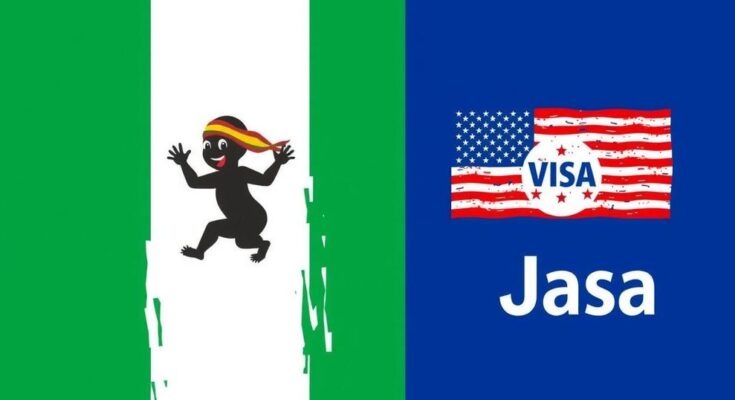A 2023 U.S. visa overstay report shows Ghana has surpassed Nigeria in B1/B2 and educational visa abuse rates. Ghanaians had a 7.50% overstay rate for B1/B2 visas and 21% for F, M, and J visas, while Nigeria reported 7.14% for B1/B2 and 15.60% for F, M, and J visas. The overall number of suspected overstays indicates growing challenges in visa compliance among various nationalities.
A recent report by the United States government regarding visa overstays for the fiscal year 2023 indicates that Ghana has surpassed Nigeria in the non-immigrant visa overstay rates for B1/B2, and F, M, and J categories from October 2022 to September 2023. Specifically, the report reveals that out of 25,454 B1/B2 visas issued to Ghanaians, 1,910 resulted in overstays, equating to a 7.50% abuse rate. In the F, M, and J categories, with 2,559 visas issued, 537 Ghanaians overstayed, reflecting a notably higher abuse rate of 21%. Comparatively, Nigerians exhibited a 7.14% overstay rate for B1/B2 visas and 15.60% for F, M, and J categories, affirming Ghana’s rising trend in visa non-compliance. The report, highlighted by MyNewsGh.com, meticulously categorizes and analyzes the overstays, providing crucial insights into the immigration behavior of Ghanaians and Nigerians. Notably, the overall figures show 510,363 suspected in-country overstays and 54,792 out-of-country overstays at the end of the fiscal year, representing a broader issue of visa compliance among travelers. The data reveal that while Ghana’s B1/B2 overstay percentage exceeds Nigeria’s, Nigerian student and exchange visitor overstay rates significantly trail those of Ghana, indicating a complex landscape of immigration deliberations. To contextualize Ghana’s performance over the years, the visa issuance and overstay rates have fluctuated. For instance, in 2019, Ghanaians were issued 28,844 B1/B2 visas with a 5.09% overstay rate, contrasting with the current report. These trends underscore a shift in immigration patterns and non-compliance over the years, drawing attention to the need for stringent visa issuance practices. This development reflects not only on Ghana and Nigeria but also on the wider implications for U.S. immigration policies affecting various nations in Africa.
The issue of non-compliance with U.S. visa regulations, specifically through overstays, has garnered increasing attention as governments seek to understand migration patterns and their implications for national security and immigration policy. Visa overstays refer to individuals who have remained in the United States beyond their authorized stay, whether due to unfiled extensions, changes in visa status, or other circumstances. The fiscal year 2023 report sheds light on the nuances of visa overstays among different nationalities, particularly contrasting Ghana and Nigeria’s behaviors regarding B1/B2 (business and tourism) and educational (F, M, J) visas, providing a foundation for understanding shifts in immigration attitudes within these countries.
The latest data on U.S. visa overstays reveals a noteworthy shift, with Ghana now leading Nigeria in abuse rates for certain non-immigrant visas during the 2023 fiscal year. This trend may significantly impact future visa policies and underscore the importance of understanding the factors contributing to visa non-compliance. As global travel norms continue to evolve post-pandemic, both countries may need to recalibrate their approaches to international travel and residence in the United States, aiming to improve compliance and foster better immigration relations.
Original Source: www.ghanaweb.com




